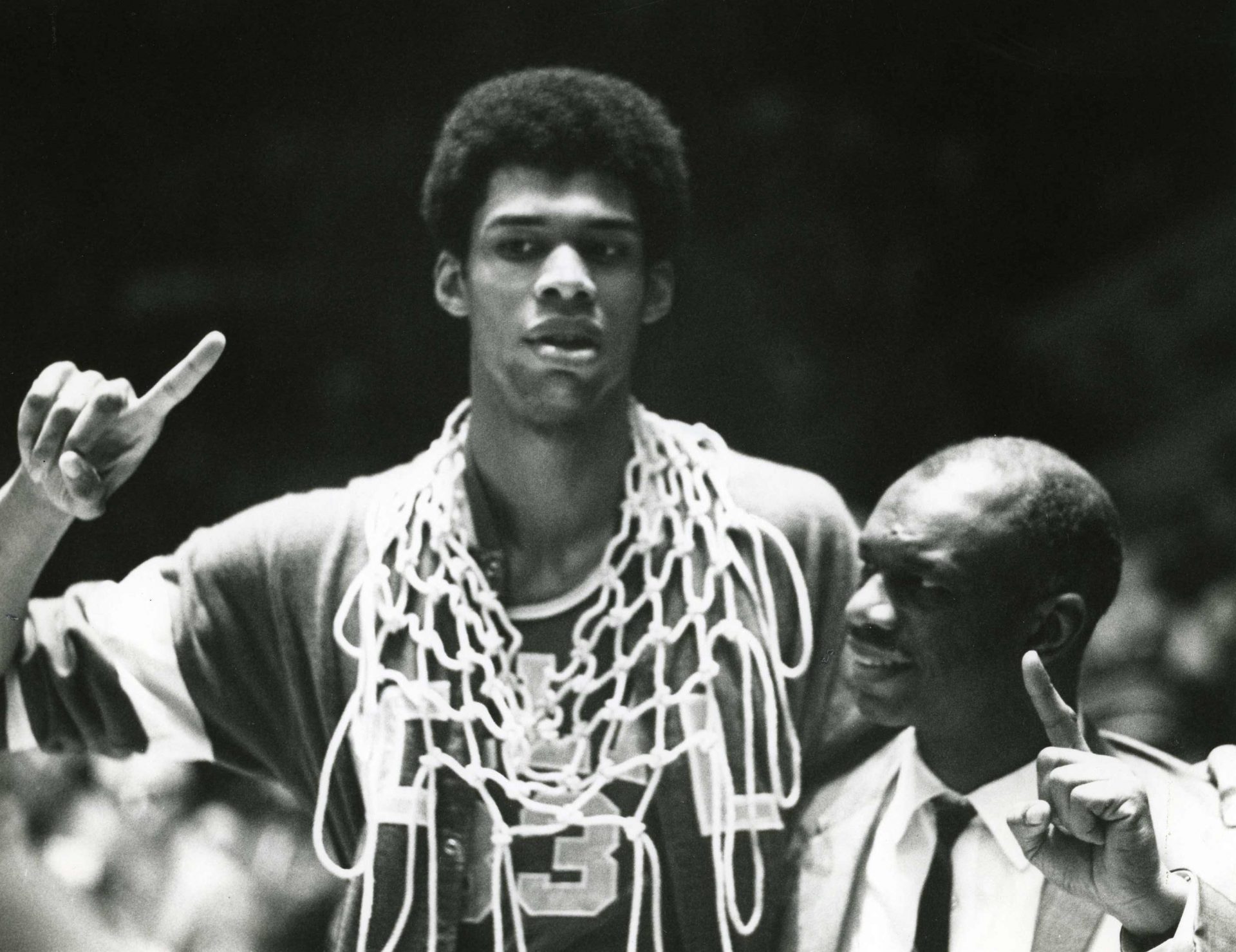An extraordinary roster of future NBA stars once dominated college courts with record‑shattering performances, national titles, and standout awards. From Alcindor’s Bruins dynasty to Curry’s Wildcats run, these careers set the stage for pro greatness—let’s dive into the top NBA players who had Legendary College Careers.
NBA Players With Historic College Careers
Kareem Abdul‑Jabbar
At UCLA (1966–69), Lew Alcindor led the Bruins to an 88–2 record and three straight NCAA titles (1967–69), earning Final Four Most Outstanding Player honors each year.
He averaged 26.4 points and 15.5 rebounds per game during that span, becoming a three‑time Consensus All‑American before entering the NBA as the first overall pick.
Bill Walton
Walton starred for UCLA’s back‑to‑back undefeated squads in 1972–73 (30–0) and 1973–74 (30–0), capturing NCAA crowns both seasons.
In the 1973 title game, he poured in 44 points on 21‑of‑22 shooting with 13 rebounds—often hailed as college basketball’s greatest single‑game offensive performance.
Oscar Robertson
“The Big O” elevated Cincinnati to consecutive Final Fours in 1959 and 1960, narrowly missing a title each time. Over three varsity seasons, he amassed a 79–9 record (.897) and averaged 33.8 points per game, cementing his status as college basketball’s first superstar guard.
Michael Jordan
As a UNC freshman in 1982, Jordan hit the championship‑winning jumper against Georgetown, sparking his legend.
In three seasons, he averaged 17.7 points, 5.0 rebounds, and 1.8 assists per game on 54.0% shooting, earning two All‑American selections before the 1984 NBA draft.
Dean Smith famously remarked, “Michael Jordan isn’t Al Wood, but he’s a great freshman prospect. He has talent. He’s a very quick learner. He’s a bright student, which passes on to the court and is a remarkable young man who has fit in extremely well,” underscoring Jordan’s immediate impact at UNC.
Larry Bird
Bird propelled Indiana State to a perfect 33–0 season entering the 1979 title game, averaging 29.0 points, 14.8 rebounds, and 6.0 assists per contest.
He led the nation in scoring (30.3 PPG) and was a two‑time MVC Player of the Year (1978, 1979), leaving as the Sycamores’ all‑time scoring leader.
He once said, “I have always been confident in my skills and once the game got going I knew I was probably the best player on the floor most of the time whether it was junior high, high school or college,” reflecting the unshakeable self‑belief that fueled his domination at every level
Tim Duncan
He made the transformation at Wake Forest University (Section 1993–97), where he was a three‑times All‑American and twice ACC Player of the Year (Section 1996, 1997) as he led the Deacons to back to back ACC tournament titles.
He averaged 16.5 points, 12.3 rebounds and 2.2 blocks in four seasons, closing his career as Wake Forest’ all-time figure in all rebounds.
David Robinson
Robinson’s senior year at Navy (1986–87) saw him win both the Naismith and Wooden Awards after averaging 28.2 points, 11.8 rebounds, and 4.5 blocks per game.
He led the Midshipmen to an Elite Eight berth in 1986, ending Nathe Vy’s 22‑year NCAA drought and establishing himself as college basketball’s premier big man.
Patrick Ewing
Ewing guided Georgetown to three championship appearances in the NCAA (1982, 1984, and 1985), winning the 1984 tournament while earning the dignity of the Final Four Most Outstanding Player.
He was a three‑time Consensus First‑Team All‑American (1983–85) and Big East Player of the Year in 1984 legitimately enshrining the Hoyas as a national power.
Kevin Durant
Durant started his college basketball career (2006–07) as a Texas freshman and became the Naismith College Player of the Year Award-winning side’s tenacious freshman.
KEEP READING: PIC: NBA Legends Kareem Abdul-Jabbar and Magic Johnson Mark Their Attendance for the UCLA-MSU Showdown
He averaged 25.8 points and 11.1 rebounds per game, one of three individuals in the country to notch the 20/10 mark. He led the Longhorns to 25–10 and earned Big 12 Player of the Year.
Stephen Curry
At Davidson (2006–09), Curry set the NCAA single‑season three‑point record with 162 makes in 2008 and scored 40 points in a Sweet 16 upset over Wisconsin.
He averaged 31.6 points per game over five 2008 NCAA Tournament contests, carrying the Wildcats to the Elite Eight and announcing his arrival on the national stage.
Bob McKillop praised Stephen Curry’s court awareness bluntly: “Most people don’t see the game this early,” capturing how Curry’s vision set him apart as a Davidson freshman.
College Sports Network has you covered with the latest news, analysis, insights, and trending stories in college football, men’s college basketball, women’s college basketball, and college baseball!


